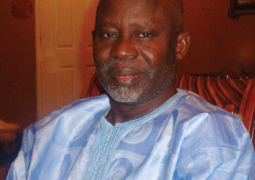"Law schools everywhere face difficult challenges, but throughout the developing world they perform a vital role in nation-building and the promotion and protection of human rights, democracy and the rule of law," said Professor Kim Economides.
The legal expert and director of Legal Issues Centre, Faculty of Law of University of Otago, New Zealand, made these remarks while speaking to law students of the University of the Gambia.
He was giving a lecture on the theme, "The role of the legal profession in development."
The visiting law professor is in The Gambia, at the invitation of the Gambia Bar Association.
He told his audience of legal practitioners, law students and journalists that "law schools commonly educate the future legal, political and economic elite of developing nations and, therefore, hold enormous potential to establish professional values that can resist and challenge corruption, greed and abuse of political and economic power."
According to Prof. Kim, by contrast in law schools in advanced capitalist democracies, complacency assumes the existence of the rule of law, and even ignores ethical and professional values in favour of emphasising technical legal skills and knowledge of legal rules.
"law schools everywhere," Prof. Economides added, "the challenge is how best to revive and communicate liberal and human values alongside technical skills."
"Our very best law schools show students not only how to handle legal rules, but instil a sense of obligations lawyers owe to themselves and the society at large."
He further stated that a law degree is often a passport to economic security, but that success as a lawyer is no longer measured purely in terms of material wealth.
He noted that public service, defending human rights, free speech and representing the weaker sections of the community are now seen as equally important professional goals - both for individual lawyers and their professional associations, as serving corporate clients.
He further noted that lawyers, whether academics or practicing, who invest in legal professional values may legitimately consider themselves as part of "a great and noble occupation."
"This legacy of professionalism may, in the long run, prove far more enduring and significant, both for them and their nation, as owning a luxurious home, large cars or expensive clothes," he added.
"Even in the short-term, investing in an ethical reputation is not bad business, given that competition in the market for the legal services increasingly has to do with quality than price," Prof. Kim told the audience.
He focused on the role of teachers in instilling and promoting ethical leadership rather than any particular knowledge base or skills set that currently defines the core curriculum, whether set by state, legal markets or professional associations.
Professor Kim Economides declared that his message is a simple one, noting that if any of these challenges confronting lawyers in the developing world are to be adequately met, there needs to be trust and ongoing collaboration between academic and practising lawyers.
"Given that full-time academic lawyers have yet to be established in The Gambia, legal practitioners and judges will need to consider how best, and when to invest in the future intellectual development of Gambian lawyers," he indicated.
"Part-time legal academics," he said, "will at some point need full-time academic support, particularly if independent legal research on the Gambian legal system is to be produced"
"This research should not be delayed too long as it will facilitate the effective targeting of legal resources on areas of greatest need," he advised.


